
ICAS Bulletin (online ISSN 2836-3418, print ISSN 2836-340X) is published every other week throughout the year at 1919 M St NW, Suite 310, Washington, DC 20036.
The online version of ICAS Bulletin can be found at chinaus-icas.org/bulletins/.
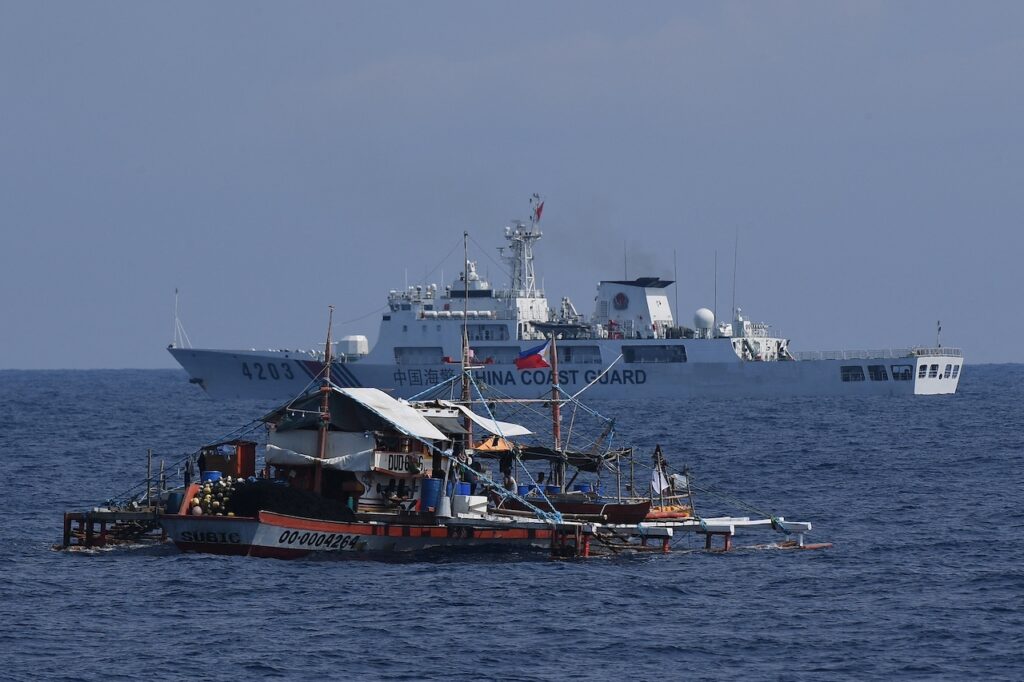
– On July 2, Chinese and Philippine officials met in Manila in hopes of easing tensions in the South China Sea. This meeting came after one of their most serious confrontations at Second Thomas Shoal..
– On June 28, the Chinese Foreign Ministry spokesperson called on Washington to stop “supporting the Philippines’ provocations”and instead “take practical actions to safeguard peace and stability in the South China Sea.”
– On June 26, the Philippine’s Ambassador to the U.S. said that Manila would not request U.S. assistance in resupplying its troops on the disputed territory, clarifying that the U.S. was only providing “visuals” for the South China Sea skirmishes.
– Anonymous Philippine and U.S. government officials said that both Manila and Washington are seeking to de-escalate tensions in the South China Sea, following the recent influx of confrontations with Chinese Coast Guards in the area.
– On June 21, in response to a reportedly violent confrontation, the Philippines’ executive secretary said that the Philippines will not invoke the mutual defense treaty with the U.S., claiming that it “was probably a misunderstanding or an accident.”
– In an interview with BBC, the U.S. Ambassador to China Nicholas Burns said that Washington and Beijing are communicating more frequently and regularly to prevent conflicts amidst rising tensions in the South China Sea.
Associated News References:
“China and the Philippines hold crucial talks to ease tensions after intense clash in disputed waters,” AP, July 2, 2024
“China urges U.S. to stop supporting the Philippines’ ‘provocations’,” Reuters, June 28, 2024
“Philippines has not sought US resupply support in China dispute -ambassador,” Reuters, June 26, 2024
“U.S. and Philippines seek to de-escalate after sea skirmish with China,” The Washington Post, June 25
“Philippines won’t invoke mutual defense treaty with US after Chinese confrontation at disputed shoal,” AP, June 21, 2024
“South China Sea tensions force US and Beijing to talk more,” BBC, June 21, 2024
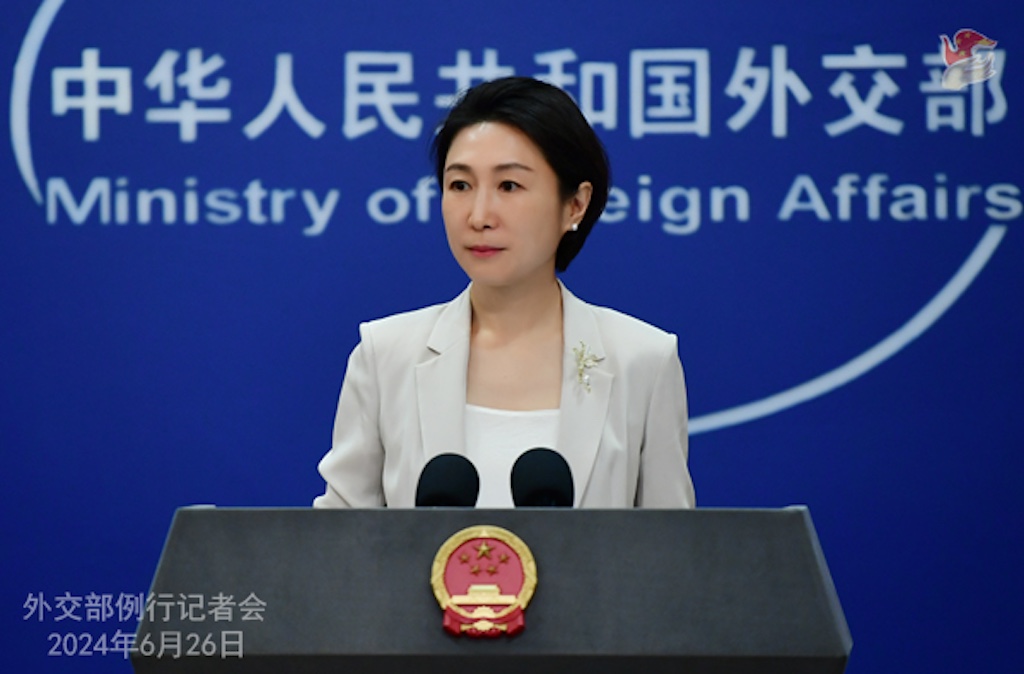
– Chinese Foreign Ministry spokesperson said on June 27 that two giant pandas, Yun Chuan and Xin Bao, have left for a flight to San Diego Zoo in California as an effort to show “the friendship between China and the rest of the world.”
– In an interview with The Wall Street Journal, U.S. Ambassador to China Nicholas Burns said that Beijing has been undermining the people-to-people exchange it has called for by actively suppressing U.S.-organized events and fueling anti-American sentiments.
– The Chinese Foreign Ministry regarded Ambassador Burns’ accusations as “far-fetched” and claimed that the statements “deviate from the important consensus reached by the two heads of state.”
– U.S. Deputy Secretary of State Kurt Campbell said that the United States should recruit more STEM students from India, not China, due to security concerns about the students’ access to sensitive technology. Campbell further stated that the U.S. should remain careful not to eliminate ties with China, and accused Beijing of being largely responsible for all deteriorations in the U.S.-China exchanges.
Associated News References:
“China Says Two Pandas Are Heading to US in Show of ‘Friendship’,” Bloomberg, June 27, 2024
“China rejects U.S. envoy’s comment that it hinders people-to-people exchanges,” Reuters, June 26, 2024
“In Rare Rebuke, U.S. Ambassador Accuses China of Undermining Diplomacy,” The Wall Street Journal, June 25, 2024
“U.S. needs Chinese students in humanities, Indian students for sciences, U.S. diplomat says,” NBC, June 25, 2024
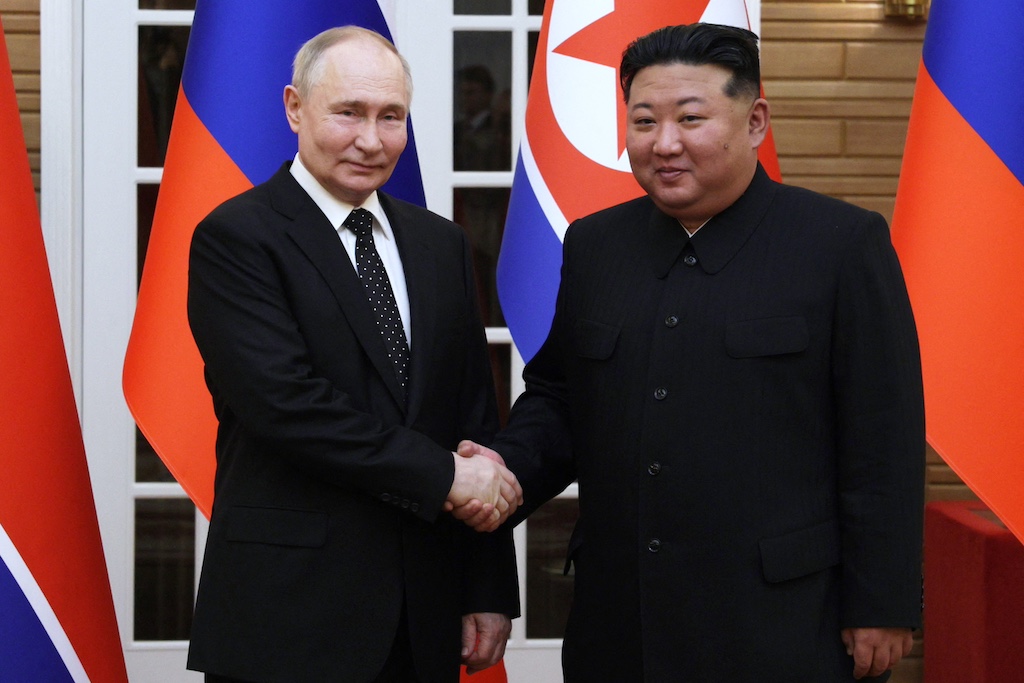
– The U.S., Japan, and South Korea completed their first trilateral military exercise on June 29 as a part of a larger effort to strengthen Asian security partnerships in response to the rising military threats from North Korea and China.
– On June 28, the U.S.’s deputy U.N. ambassador urged China to use its influence over North Korea and Russia to end the “increasingly dangerous military cooperation” between the two countries and warned of intervention if the security outlook in the Korean Peninsula worsens.
– China’s deputy U.N. ambassador responded to such claims by stating that North Korea was provoked by U.S. joint military drills and regarded U.S. involvement as the cause for continued tensions in the Peninsula.
– On June 27, U.S. Ambassador to China Nicholas Burns said that Beijing miscalculated the impact of its support for Moscow on its relationship with Europe. He claimed that this move has partly led the European Union to consider China as a systemic rival.
– In a separate speech in Shanghai on June 26, Burns stated that China “is not neutral, but has effectively sided with Russia in this war,” and regarded Beijing’s support for Moscow as a “major mistake.”
– Commenting on Russia’s recent mutual defense agreement with North Korea, U.S. Air Force General C.Q. Brown noted that this agreement could create friction between Beijing and Moscow’s relationship.
Associated News References:
“As North Korean and Chinese threats rise, US looks to lock in defense partnerships with Asian allies,” AP, June 29, 2024
“Global powers clash at United Nations over North Korea,” Reuters, June 28, 2024
“China Miscalculated With Europe in Backing Russia, US Envoy Says,” Bloomberg, June 27, 2024
“US ambassador calls China’s tech support for Russia during Ukraine invasion a ‘major mistake’,” The Washington Post, June 26, 2024
“Russia’s North Korea defense deal could create friction with China: US general,” Reuters, June 23, 2024

– The Chairman of the U.S. House Select Committee on China warned against Chinese subsidies in industries such as drones, semiconductor, shipmaking, and steel that threaten U.S. interests by dominating global markets and creating U.S. supply chain dependencies.
– Following OpenAI’s decision to restrict access to its application programming interface (API) in China, numerous Chinese AI developers have launched free services for OpenAI API users to migrate to their Chinese AI models.
– The U.S. Department of Commerce is now investigating state-backed China Mobile, China Telecom, and China Unicom over concerns that these firms are collecting American data through their U.S.-based services and providing it to Beijing.
– China’s Bytedance is collaborating with a U.S. chip designer, Broadcom, to develop an advanced, 5 nanometer AI chip. This collaboration complies with U.S. export controls and would provide a stable supply of chips to Bytedance amidst U.S.-China tensions.
– On June 21, the Biden administration proposed new Treasury Department rules that would prohibit U.S. investments in Chinese companies in critical technology industries, including semiconductor, quantum computers, and AI.
Associated News References:
“Chinese subsidies for drones, chips put U.S. at risk, House panel says,” The Washington Post, June 26, 2024
“Chinese AI firms woo OpenAI users as US company plans API restrictions,” Reuters, June 25, 2024
“US probing China Telecom, China Mobile over internet, cloud risks,” Reuters, June 25, 2024
“China’s ByteDance working with Broadcom to develop advanced AI chip,” Reuters, June 23, 2024
“U.S. Moves Ahead With Plan to Restrict Chinese Technology Investments,” The New York Times, June 21, 2024

– In response to the U.S. and India’s concerns over the Maldives’ defense agreements with China, Maldives’ Ambassador to the U.S. Abdul Ghafoor Mohamed said that these agreements should not be a source of concern.
– Ghafoor further stated that the Maldives consider the U.S., India, and China all as partners of importance, and said that the Maldives’ relations with the U.S. and India remain strong.
– On June 24, Canada’s finance minister announced that Ottawa will open a 30-day public consultation period to decide whether it should impose tariffs on Chinese electric vehicles over concerns of overcapacity and unfair competition, as the U.S. and EU have.
– Following Washington’s and Brussel’s tariffs, a survey of 492 Japanese companies show that the majority of firms consider it unnecessary for the Japanese government to impose tariffs on Chinese electric vehicles as the U.S. did in recent months.
Associated News References:
“Maldives US envoy says China, US and India are all important partners,” Reuters, June 28, 2024
“Canada takes step toward boosting tariff regime on Chinese EVs by announcing consultation,” CBC, June 24, 2024
“Most Japan firms see no need to follow the U.S. with tariffs on China, Reuters poll finds,” Reuters, June 19, 2024
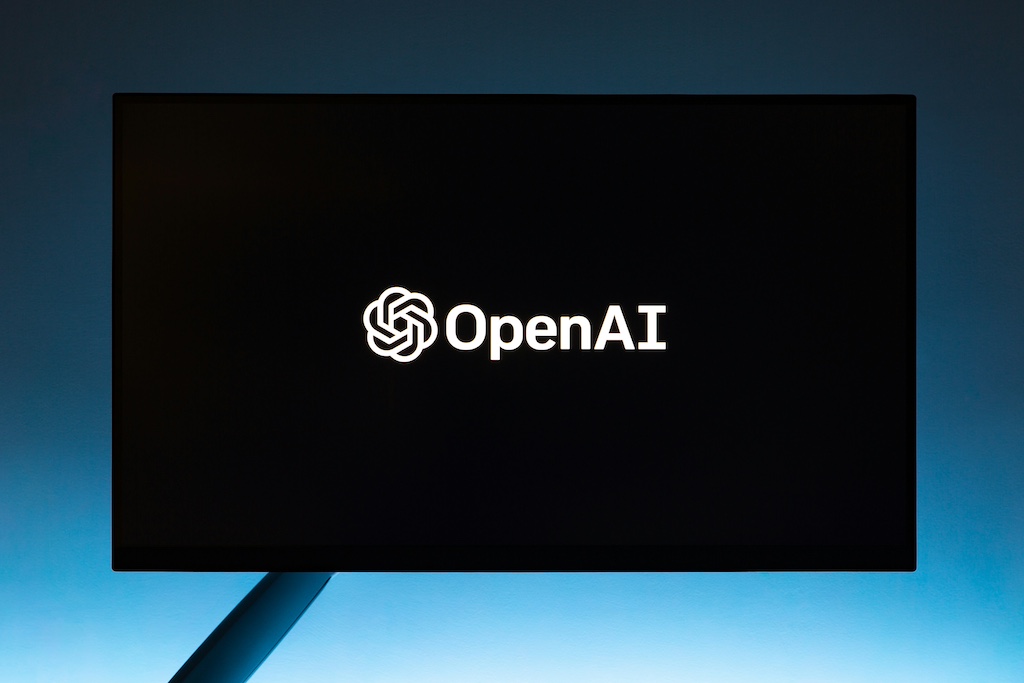
“UN adopts Chinese resolution with US support on closing the gap in access to artificial intelligence,” AP, July 2, 2024
“Satellite Images Show Expansion of Suspected Chinese Spy Bases in Cuba,” The Wall Street Journal, July 2, 2024
“Exclusive: US law firm Dechert considering shuttering offices in Hong Kong, Beijing, say sources,” Reuters, June 30, 2024
”China says U.S. can’t stop it from taking ‘giant steps’ in space,” The Washington Post, June 27, 2024
“Prospect of low-priced Chinese EVs reaching US from Mexico poses threat to automakers,” ABC, June 26, 2024
“Trade feuds aside, Chinese firms are committed to the U.S. market, survey shows,” CNBC, June 26, 2024
“Historic Moon Mission Moves China Ahead in Space Race with U.S.,” The Wall Street Journal, June 25, 2024
“Huawei’s Secret Ally in the US-China Tech War: A Science Nonprofit Based in DC,” Bloomberg, June 25
“Apple is looking for an OpenAI alternative in China — where there is no ChatGPT,” Quartz, June 20, 2024
“Despite fentanyl crackdown, Chinese sellers are open for business,” The Washington Post, June 20, 2024
“Yellen says US ties with Vietnam don’t require it to sever ties with Russia, China,” Reuters, June 20, 2024
“China Has No Favorite in Biden-Trump Race, US Intelligence Finds,” Bloomberg, June 19, 2024
“US lawmakers meet with Dalai Lama in India’s Dharamshala, sparking anger from China,” ABC, June 19, 2024
“US risks angering China as it approves $360m weapons sale to Taiwan,” The Independent, June 19, 2024
June 26 hosted by Wilson Center
June 18 hosted by Financial Times
June 12 hosted by Center for a New American Security
July 4 hosted by South China Morning Post
July 8 hosted by Heritage Foundation
July 11 hosted by Global Institute for Tomorrow
July 11 hosted by Center for Strategic and International Studies
ICAS Scholars Discuss U.S.-China Relations with GWU Summer Program Students
June 20, 2024
On Thursday, June 20, 2024, a group of high school students from a George Washington University summer program visited the ICAS office to learn about the Washington, D.C. think tank community and the complexities of U.S.-China relations.
After an introductory talk on the background and changing nature of U.S.-China relations, the discussion largely focused on understanding current trade tensions, the competition over green technology, and the ongoing, necessary attempts to stabilize this vital relationship.
Blue Carbon & Climate Change 2024 Q2 Soon to Be Released!
On July 3, the ICAS Blue Carbon & Climate Change Program will release its BCCC Quarterly newsletter for 2024 Q2. This issue features a ‘Theme of the Quarter’ on “AI’s Role in Solving Climate Change” and a ‘Blue Carbon Country Profile’ on Brazil.’
Released each quarter, the BCCC Quarterly records the most important trends and developments regarding blue carbon policies and regulations in China, the U.S., and other regions, as well as international regimes, such as under the United Nations framework. It also includes two special sections—the ‘Theme of the Quarter’ and the ‘Blue Carbon Country Profile’—that aim to bring a fresh and applicable element to each issue.
U.S. tariffs on Chinese EVs are anti-EV, anti-climate
By Yilun Zhang
July 2, 2024
Tariffs on Chinese electric vehicles (EVs) have reached a pivotal moment over the past month. Following months of misleading overcapacity claims, the United States announced a sharp increase in its Section 301 tariffs on Chinese EVs from 25 percent to 100 percent. Within a month, the EU also revealed a plan to impose tariffs on Chinese EVs, albeit through a more tailored approach.
The debate between China and the West over alleged overcapacity and unfair trade practices will continue in the foreseeable future as the West refuses to accept China’s repeated explanation that the dominant EV power’s competitiveness stems from its “unique comparative advantage”…
This original article was published by the Xinhua on June 30, 2024
EU and US do not want the same thing from their China EV tariffs, and they will get very different outcomes
By Yilun Zhang
June 26, 2024
Just a month after the United States announced a sharp increase of its Section 301 tariffs on Chinese electric vehicles (EVs) from 25% to 100%, the European Union (EU), in recent days, also announced its long-expected decision to impose tariffs on Chinese battery electric vehicles (BEVs).
Behind their seemingly similar tariffs, however, Brussels and Washington have very different underlying motivations that derive from diverging strategic considerations for their own EV industries as well as their respective relations vis-a-vis China…
How the Ukraine Conflict is shaping Arctic defense budgets
By Nong Hong
July 2, 2024
The ongoing conflict in Ukraine since February 2022 has reverberated across global security and defense policies, particularly affecting the eight Arctic states: Russia, United States, Canada, Denmark (Greenland), Norway, Sweden, Finland, and Iceland, all members of the Arctic Council. The Arctic, renowned for its natural resources and strategic maritime routes, has long been a focal point of geopolitical interest. The Ukraine conflict has heightened security concerns, prompting a reassessment of defense budgets and military strategies among these nations.
One of the most direct impacts of the Ukraine conflict on Arctic states has been a notable increase in defense expenditures. The conflict underscored the unpredictability of international relations and the potential for military threats, prompting many Arctic countries to bolster their defense budgets to enhance military capabilities and preparedness…
Legal moves turn South China Sea into a public image battleground
By Nong Hong
June 25, 2024
Recent clashes between China and the Philippines over the Second Thomas Shoal have heightened tensions in the South China Sea. The Philippines has maintained a presence there since 1999 by stationing a small contingent of marines on the BRP Sierra Madre, a deliberately grounded World War II-era ship symbolising its claims over the area…
However, is the Philippines truly pursuing a legal outcome? The procedures of the Philippines’ submission to the CLCS are beyond question. Any coastal state that has ratified UNCLOS has the right to submit applications to the CLCS. Similarly, China sent a note verbale on June 18 to the United Nations secretary general, arguing that any submissions regarding the disputed waters in the South China Sea should not be considered….
This commentary was originally released by South China Morning Post on June 25, 2024
Plenum priorities that could reshape China’s economic future
By Sourabh Gupta
June 28, 2024
The Chinese Communist Party’s (CPC) third plenary session in July 2024 is an opportunity to enact major structural reforms. The CPC should prioritise reforms to untie household consumption from housing, add a redistributive role to state fiscal functions and ensure the land-based model of finance for urban development yields to a central transfers and local taxes-backed one. The CPC must shrink the housing sector’s footprint on growth and consumption, shift from indirect to direct taxes and plug the structural revenue deficits that have pushed local governments to raise cash from opaque, off-budget mechanisms.
This commentary was originally released by East Asia Forum on June 28, 2024
Data on Empowering AI for Climate Action
By Zhangchen Wang
June 27, 2024
The power of AI in data processing and analysis has already been widely acknowledged. In spite of its imperfections, utilizing this crucial capability effectively can help humanity make informed decisions, predict future scenarios, and address pressing challenges. Notably, within the global context of climate change, the potential of AI to assist in addressing this challenge deserves special attention.
AI can enhance humans’ understanding of climate change and facilitate climate change mitigation efforts through many different ways…
On Tuesday, July 2, 2024, Senior Fellow Sourabh Gupta was quoted by China Daily on the commemoration in Beijing of the Five Principles of Peaceful Coexistence.
On Wednesday, June 28, 2024, Senior Fellow Sourabh Gupta was quoted by South China Morning Post on the commemoration in Beijing of the Five Principles of Peaceful Coexistence.
On Tuesday, June 27, 2024, Senior Fellow Sourabh Gupta was quoted by South China Morning Post on China’s approach to high-tech development alongside the Third Plenum.
On Tuesday, June 27, 2024, Senior Fellow Sourabh Gupta was quoted by China Daily on investment decoupling in U.S.-China relations.
On Thursday, June 20, 2024, Senior Fellow Sourabh Gupta was interviewed by TRT World on TikTok and its legal challenge in U.S. court.
On Tuesday, June 27, 2024, Senior Fellow Sourabh Gupta was quoted by China Daily on Secretary Yellen’s comments on U.S.-China trade frictions.
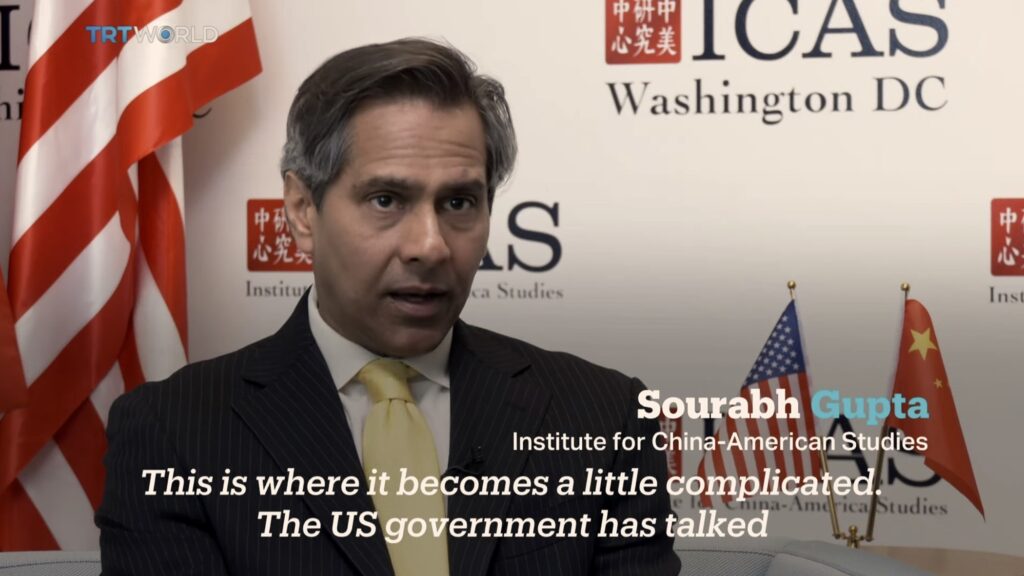

The Institute for China-America Studies is an independent nonprofit, nonpartisan research organization dedicated to strengthening the understanding of U.S.-China relations through expert analysis and practical policy solutions.
1919 M St. NW Suite 310,
Washington, DC 20036
icas@chinaus-icas.org
(202) 968-0595
© 2025 INSTITUTE FOR CHINA-AMERICA STUDIES. ALL RIGHTS RESERVED.